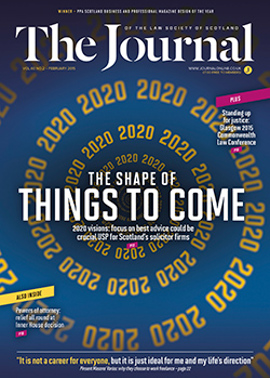Law reform roundup
Counter-Terrorism and Security Bill
Following its second reading letter to MPs in December, the Society sent a full briefing to all Scottish peers ahead of the House of Lords second reading on 13 January. The Society reiterated its concerns surrounding the bill, particularly that it is susceptible to human rights challenge and that the fast track procedure does not provide the opportunity for proper scrutiny. The proposed temporary exclusion order, requiring an individual with the right of abode not to return to the UK, raises ECHR issues, as do the provisions allowing for seizure and temporary retention of passports by the police, where an individual is suspected of intending to leave the UK, or has arrived in the UK with the intention of leaving soon after for the purposes of terrorist activity. The Society highlights that travel restriction powers were introduced in 2011 (Terrorism Prevention and Investigation Measure orders), and questions whether the seizure provision is a justified interference with the article 8 right to respect for private and family life.
A new Magna Carta?
The Political & Constitutional Reform Select Committee produced a paper entitled A new Magna Carta? which examines the nature of the UK constitution and options for change, and issued it for public consultation and comment. In its response, the Society’s Constitutional Law Committee highlighted how constitutional reform has been at the forefront of parliamentary matters across the UK since 1997, the Scottish Parliament, the Human Rights Act 1998, the creation of the Supreme Court and a number of referendums being particular highlights. The paper suggests three options as a way forward; the Society states that it would not be in favour of a non-statutory constitutional code, but sees a written constitution as the preferable option and a more focused constitutional basis for a modern state.
British Sign Language (Scotland) Bill
The Society’s Equalities Committee has submitted written evidence on this bill. The bill aims to promote the use and understanding of British Sign Language (BSL) and to provide for the preparation and publication of a BSL National Plan for Scotland. The committee is supportive of this primary aim, but highlights the need for clarity as to the division of competence between the bill and existing equalities legislation, particularly as the bill is explicit in determining that BSL is to be promoted as a minority language rather than an equalities issue. Scottish public bodies are required to comply with specific duties outlined in the Equality Act 2010, and the committee questions whether consideration should be given to incorporating a more generic obligation to promote minority languages into a new specific duty.
Scottish Tax Tribunal Rules
The Society’s Administrative Justice committee responded to a Scottish Government consultation on the draft rules. In relation to the First-tier Tax Tribunal for Scotland Rules 2015, the committee noted that it would appear to be logical and sensible to adopt the existing rules of the UK First-tier and Upper Tax Tribunals, which have been developed by the Tribunal Procedure Committee under the Tribunals, Courts and Enforcement Act 2007, and already subject to UK-wide consultation. The lack of an accompanying policy document explaining any departure from the main rules, prevented consultees from fully considering and responding. The draft Upper Tax Tribunal for Scotland Rules 2015 largely replicated the UK Upper Tax Tribunal Rules, and the reasons for any exceptional departures were apparent.
Statutory duty of candour
The Society’s Health & Medical Law Committee responded to the Scottish Government consultation covering the proposed duty for health and social care services. The committee welcomes the policy objectives and positive intentions of this proposal, but notes that a duty of candour already exists as an ethical obligation imposed by governing bodies of the various individual healthcare professionals, so it is unclear what the proposal will add to existing policy and guidance. The consultation also highlights existing problems towards a consistency in approach. While the committee recognised the value of a consistent approach, given the breadth of provision within health and social care, this would be challenging for organisations to enforce. There may also be issues pertaining to interpretation and application, especially where the regulations rely on subjective assessments. Compliance may therefore be resource intensive and difficult to monitor.
Full details of the above, and further information on the current work of the law reform department, can be found at www.lawscot.org.uk/forthepublic/law-reform-consultations-and-bills The team can be contacted on any of the matters above through louisedocherty@lawscot.org.uk or follow us on Twitter: @lawscotIn this issue
- Supreme Courts: the US and UK compared
- Taking farmers to market
- Queuing up for Street Law
- Cash for your body
- Ivor Guild: an appreciation
- Reading for pleasure
- Journal magazine index 2014
- Opinion: Waqqas Ashraf
- Book reviews
- Profile
- President's column
- More benefits from development plan approval
- People on the move
- On track for 1 April
- In five years' time...
- Glasgow 2015: the three Rs
- Powers of attorney: the Inner House decides
- Freelancing goes mainstream
- Socially acceptable?
- Searching questions
- Separation and the stored embryo
- Effect, not cause: is obesity a disability?
- Goodbye to the Lamborghini?
- Scottish Solicitors Discipline Tribunal
- The dispute resolvers
- Take care with Lender Exchange
- Law reform roundup
- From the Brussels office
- Equal pay: a professional imperative
- Are you a cyber risk?
- Ask Ash
- Property in the spotlight
- Sweet smell of added value
- Legally IT: the evolving lawyer






